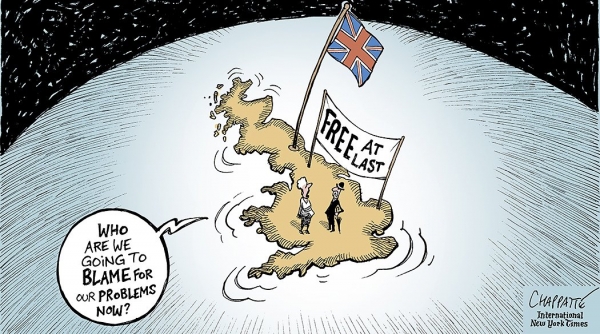Klaus Kunzmann, distinguished professor of spatial planning at the Technical University of Dortmund, give his reaction to Brexit and ponders what it means for planning and planners.
England (though not Scotland) has voted for Brexit. It will take months until those who voted against Europe will realize that they have made a tremendous mistake. They have voted for cocooning nationalism, and against the idea of a Europe which Churchill had in mind when addressing students in Zürich in 1946 when he said “There is a remedy which … would in a few years make all Europe … free and … happy. It is to re-create the European family, or as much of it as we can, and to provide it with a structure under which it can dwell in peace, in safety and in freedom. We must build a kind of United States of Europe.”
Why did people vote Leave?
The exit voters may have dreamt of returning to the grandiose times of the British Empire, when leaving the European Union. The old voted to cut the bridges from the British Isles to the continent, which they may have seen just as a location for warm and sunny summer holidays. Above all, the Brexiters have (rightly) voted against the bureaucracy in Brussels, for being urged to participate in welcoming refugees from the Middle East and Africa.
The idea of building a strong Europe against North America, Russia and China has not been in their mind, and some may have even been afraid of Germanic dominance in Europe. Gradually, however, they will become aware of all the negative implications of their vote for the British economy, for universities and research, and last but not least for their own travel abroad.
Implications for planning and planners
What will be the consequences for planning, and for the planning community in Europe?
In recent years the enthusiasm for European spatial planning, triggered off twenty years ago by the ESDP, has vanished. The well-meant theoretical concept has been replaced by more pragmatic strategies for territorial cohesion in Europe. These strategies aim at promoting the idea of Europe by projects, and by shifting some money from Brussels to less successful cities and regions in Europe, rather than paper tiger spatial plans, which just satisfy the professional and academic community and do not reach the people on the ground. My spontaneous assumptions are
- That the BREXIT vote will inevitably slow down efforts towards joint planning in the European territory. A consequence of Brexit is that no UK financial resources will be in the EU treasury. Thus European bureaucrats will be less able to give favours to local governments across Europe. In turn, this will force national governments to dedicate a bigger share to local and regional governments for local and regional development.
- With BREXIT the exchange of best practice in planning will certainly slow down, and with it the processes of mutual learning. At least it will slow down efforts to create a European framework of rules and principles, if not bring them to an end. The European Commission will rethink its efforts to regulate everything, and cut red tape bureaucracy. It will have to leave more space and freedom to the national, regional and local governments.
- Fewer resources will be available, too, for planning research. The ESPON programme may be streamlined, and the impact of BREXIT on European territory will become a new key research field. European research groups will miss the valuable inputs of UK planning experience.
- The successful ERASMUS exchange of planning students across Europe will move into a different direction. British planning schools will have to anticipate that fewer students from the continent will come to Britain to benefit from the rich planning experience (and the English language) of the country. British students will stay at home rather than experiencing planning environments in other European countries: Continental planning schools in turn will strengthen their continental networks
- When analyzing the BREXIT vote academic planners may also have to rethink their fervour for participation at higher levels of planning and decision-making. They have to acknowledge the growing distance between academic writing and people’s concerns and aspirations. Maybe governance will return to government.
- The BREXIT vote may also have a positive impact on planning in Europe, as the market led-approach to economic development, very much led by UK policies, will have less support from continental countries, which still believe in the logic of the welfare state.
Obviously, all this is mere spontaneous personal speculation of a disappointed European planner at this point of time. The future will show, how planning will be affected and what the European planning community will have to face in the time ahead. In the end the BREXIT may be not really have so much impact on planning practice in Europe. The impacts on planning in the UK will certainly be a greater dependence on London’s traditional centralism.
Klaus R. Kunzmann, Potsdam/Zhengzhou 25.06.2016
Professor Kunzmann played a leading role in the formation of the Association of European Schools of Planning.

Schreibe einen Kommentar